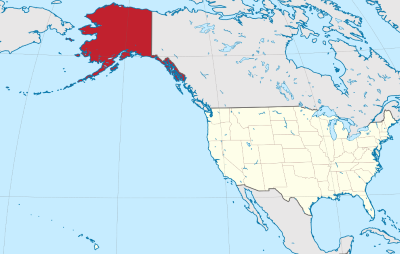Here you’ll find the largest list with Alaska hosting reviews. We’ve listed all Alaska hosting providers with our UNCENSORED review and that of users.

Quick Facts
Internet Speed: 26.4 Mbps (average); 46 Mbps (peak);
Population: 736,000 (2015);
Main Types of Connections: Cable, DSL, Fiber-optic (rare);
Average cost: ~$105 per month(!) (Numbeo.com, GCI);
Major ISPs: GCI, Borealis Broadband, Alaska Communications;
Biggest Market Share: GCI (63%);
Colocation Datacenters: Little to no existent; GCI operates a few in Anchorage and other cities
Internet in Alaska
According to fastmetrics.com, the average Internet connection speed in Alaska is 26.4 Mbps, while the average peak connection speed is 46 Mbps.
Population, Internet Penetration
According to a 2015 estimate, the current population is approximately 736,000. In the same year, 65% of Alaskans were connected to the Internet. The remaining 35% were either connected to the Internet through dated technology (i.e. dial-up) or not connected altogether.
The latter is attributed to the fact that Alaska is the largest US state with the lowest population density of all states, which means that rolling out wireline internet infrastructure evenly is little to no doable.
Main Internet Connections
The broadband network consists primarily of three types of connections. They are as follows:
– Cable Internet
– DSL Internet
– Fiber-optic Internet
– Satellite Internet (especially in remote areas)
Cable Internet is the most popular type of Internet service in Alaska, with 79.1% of the broadband-connected population.
It is closely followed by DSL Internet, which is down only a few percentages, to 69.5% of the broadband-population.
However, as with many other states, Alaska does not have proper infrastructure to support the next-gen fiber optic services currently provided by select companies, which is why only 3.2% of the population is connected to the Internet through fiber-optic networks.
The aforementioned types of connections are generally available only in areas where the Internet equipment can withstand the harsh climatic conditions of Alaska. In pockets of remote areas, the available Internet connectivity is too slow to even run basic computer programs, so customers have no choice but to opt for satellite Internet, which is inherently slower than wireline services but more stable and dependable.
The broadband market of Alaska is divided between a few major Internet Service Providers. They are as follows:
1. GCI;
2. Alaska Communications;
3. Borealis Broadband;
4. TelAlaska
Connectivity and Market Share
Alaska is not a favorable environment for a healthy and competitive broadband market relative to other states. This is mainly due to the severe subarctic climate that makes it hard for companies that already operate locally to roll out fast broadband infrastructure. Because of this, the same companies set inflated and therefore unaffordable prices for bandwidth. Furthermore, it is the reason why Alaska is only the 43rd most connected state in the United States, and why GCI owns a massive 70% of the broadband market share. (WebpageFX – 2016).
Average Prices
Price-wise, the Internet in Alaska might be the most expensive in the entire United States. At GCI alone, the cheapest package starts at approximately $75 per month and it comprises speeds of 75 Mbps downlink and 5 Mbps uplink, while the monthly bandwidth is capped to 50 GB. Upon exceeding this limit, speeds will be halved. This is not an uncommon business practice among Alaskan providers: Alaska Communications and Borealis Broadband have similarly-priced packages with similar bandwidth caps. According to Numbeo.com, the average price for an Internet subscription exceeds $100 per month, which is in line with our own ascertainment.
Colocation Datacenters in Alaska
Due to the fact that Alaska is a very expensive state to live in, and implicitly because wholesale and retail bandwidth is very expensive, there are virtually no colocation datacenters in Alaska. Miscellaneous external sources suggest that the current ISP incumbent, GCI, is the only company which offers colocation services in Anchorage and a few other cities, but at very exorbitant prices nevertheless. For accurate pricing, you are encouraged to get in touch with them for a quote. However, customers whose userbase is located in Alaska exclusively are encouraged to opt for alternative locations. A relevant location for our purposes is Seattle, which is not only one of the biggest and most affordable colocation markets in the United States, but all traffic going to Alaska goes through Seattle first, which is all the more a great location, according to Telegeography.com.

